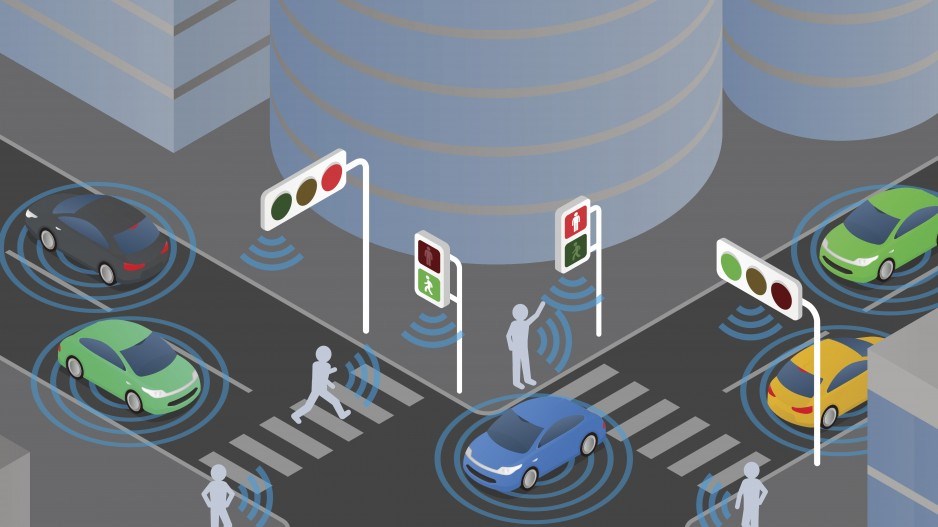Telecom giant Rogers Communications Inc. (TSX:RCI.B) and researchers at the University of B.C. are deploying 5G sensors in downtown Kelowna this week to better understand how pedestrians, cyclists and motorists interact.
The pilot project sees two LiDAR sensors being installed at the intersection of Bernard Ave. and Water St. as well Bernard Ave. and Pandosy St., with more sensors planned for three more intersections later this year.
The 5G-powered sensors have the capacity to collect more intricate data than conventional traffic cameras, such as tapping into facial recognition or logging identifying details of passersby.
All the data collected from foot and vehicle traffic will remain anonymous and secure.
UBC students will in turn use the data to examine the efficacy of crosswalks, how transit users interact with streets after arriving at their stops, where near-misses occur on roads and which parts of a block are best for pick-ups and drop-offs.
“This technology allows you to make real-time decisions and be more adaptive, rather than just things that are programmed like a clock,” UBC Prof. David Michelson, the project’s lead researcher, told Business in Vancouver.
He said possible applications could include using the sensor to recognize a pedestrian is elderly and may require more time to make his or her way over a crosswalk, or else traffic lights that would be able to detect the approach of emergency vehicles and adjust its settings to clear a path.
Michelson added the research with the 5G sensors will run long enough to collect data throughout each season of the year to determine how traffic patterns change depending on weather and climate.
He expects the first results from the research to be available by the fall.
“This is the sort of project that no single player could have done by itself,” Michelson said, referring to the partnership between UBC, Rogers, the City of Kelowna and Montreal’s Blue City Technology, which is providing software.
He said he hopes the project can help the general public recognize applications of 5G technology that go beyond mobile phones.
“When they developed 5G they were very clear they wanted to bring these non-handset applications into the mainstream,” Michelson said.
The development of 5G infrastructure in Canada means IoT sensors, smart watches, driverless cars — anything with a wireless component — will be able to interact with minimal latency.
Canada’s deployment of 5G wireless infrastructure has been a thorny for both Ottawa and two of the biggest telecom carriers amid espionage concerns surrounding China’s Huawei Technology Co. Ltd.
But Bell Canada [BCE Inc. (TSX:BCE)] and Vancouver-based Telus Corp. (TSX:T) revealed June 2 they were opting to use 5G equipment from Telefonaktiebolaget LM Ericsson (Nasdaq:ERIC) and, in the case of Telus, Nokia Corp. (HEL:NOKIA) as well.
Rogers had already previously been aligned with Ericsson, meaning this week’s announcements essentially shuts out Huawei from Canada’s future 5G infrastructure.
The decision likely comes as a relief for the federal government, which has been undertaking an extensive security review of Huawei’s equipment while facing pressure to ban the technology from its intelligence allies.
Relations between Ottawa and Beijing, meanwhile, have been icy ever since the December 2018 arrest of Huawei chief financial officer Meng Wanzhou at Vancouver International Airport following a U.S. extradition request.
Two Canadians living in China, Michael Kovrig and Michael Spavor, were soon after detained by Chinese authorities but no formal charges have been filed after more than 500 days.
“If service providers deploy a solution despite known security vulnerabilities, this not only has the potential to compromise sensitive consumer data, but it also could delay network deployments and add significant costs later to address them,” Patrick Lozada, director of global policy at the U.S.-based Telecommunications Industry Association and a former member of the U.S.-China Business Council, told Business in Vancouver in an email.
“We believe it’s most important to roll out new networks in a safe and secure manner to ensure national security interests are fully accounted for and addressed in advance. Canada is in a very good position to establish a robust and secure 5G infrastructure that will be highly competitive in the global market.”




